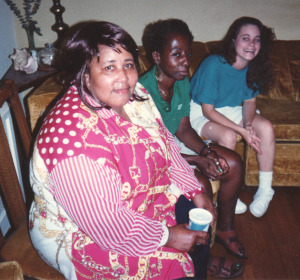 Mary “The Jewel” Harris, who died on September 4, was known by everybody in Progressive Labor Party’s Philadelphia hospital work. She was a wonderful friend, a force of nature, the salt of the earth—and a terror if you got on her bad side. Mary was also a pillar of PLP. When she worked in housekeeping, she routinely distributed up to 60 CHALLENGEs. After each issue, she would pass over a bag heavy with coins and bills.
Mary “The Jewel” Harris, who died on September 4, was known by everybody in Progressive Labor Party’s Philadelphia hospital work. She was a wonderful friend, a force of nature, the salt of the earth—and a terror if you got on her bad side. Mary was also a pillar of PLP. When she worked in housekeeping, she routinely distributed up to 60 CHALLENGEs. After each issue, she would pass over a bag heavy with coins and bills.
Mary steered many CHALLENGE readers toward the Party and was invaluable in recruiting new members. Whenever we organized union and PLP events, her participation helped guarantee success.
Mary took to heart the egalitarian promise of communism and participated in her club’s political discussions with an unpretentious sincerity. She viewed May Day as the day for “our family,” meaning the working class. Mary also embraced her hospital comrades, Black and white, as family, something she didn’t take lightly.
In a fight, she was someone you wanted on your side. When actions were needed on the job, some might be scared, but Mary was always up to the task. Short in stature, she had a booming voice that never needed amplification, and a fierceness that intimidated larger adversaries. Respect for Mary and her loyal friends and co-workers helped to restrain attacks on PL members by the union and hospital bosses.
Two years ago, Mary accompanied us when 50 hospital union retirees marched into the hospital administration offices to protest benefit cutbacks. When an executive vice president emerged with menacing security men to “reason” with us, Mary stood directly in front of him. At full volume, she yelled, “I need my medicine! I need my medicine!” The executive was about six-foot-three and Mary only came up to his belly button, but she unnerved him. Afterward, she observed with her sly grin that the administrator “looked like he was ‘bout to cry.”
One PL comrade remembers transporting Mary and a carload of her friends to a union meeting. The women workers talked about how they protected themselves in some dangerous Philly neighborhoods. The comrade was impressed by the women’s matter-of-fact courage, especially when each of them pulled knives or clubs from their purses; one even produced an enormous revolver. For these women, the need for violence was not some abstract philosophical question. Armed with PLP’s ideas they will be a formidable revolutionary force.
Mary kept up her political activism and personal relationships to the day of her death. She was so sick when she came to the emergency room that she couldn’t remember the phone numbers of the two comrades who were her emergency contacts. For six days, Mary’s friends and family didn’t know she was in the hospital. Then a hospital social worker who knew Mary from her activism found a comrade’s contact number.
Workers from many departments visited Mary in the hospital. Retirees came from their homes. Many younger workers described how she had been a mother figure to them. Worker after worker told stories like, “When my husband died, Mary gave me a bag with $1,000 she had collected.”
As her cancer rapidly progressed, Mary was soon told she needed to go into hospice. She had no local relatives. But for two of her friends and comrades, Mary was family, and on her 75th birthday they brought her home with them. Mary died three days later.
When the working class seizes power for communism, Mary’s voice will be part of that thunder.